We had the privilege of sitting down with the President of the End Overdose Alabama Chapter, Tyler Zuspann, to gain insight into their incredible work and dedication to the cause. From leading local trainings to organizing community outreach events, the Alabama chapter is making a significant impact in the fight against the overdose crisis.
During our one-on-one conversation, we explored their personal motivation for joining End Overdose, the unique challenges they face in Alabama, and the innovative ways they’re addressing overdose prevention. With a passionate team behind them, the Alabama chapter is not only saving lives but also fostering a culture of education and empowerment in their community.
EO: You and your chapter have done incredible work, Can you describe your experience as chapter president? How has it been continuing to build the chapter?
Tyler Zuspann: It’s been a great experience serving as our chapter’s president and watching how we have grown since we were founded 2 years ago. Looking back, it wasn’t always easy but it’s extremely rewarding to see how much of an impact we’ve made. I have had the opportunity to work with a lot of wonderful people who all deeply care about the overdose epidemic and I’m excited to see what the future holds for our chapter.
EO: What sparked your interest in overdose prevention/response and End Overdose in particular?
TZ: I became a part of End Overdose because I wanted to make a difference in my community. Overdose is the leading cause of death for young adults so being able to train college students and community members on overdose prevention was a great way I could make a real impact.
EO: What challenges have you faced, and how have you worked to overcome them?
TZ: One of the biggest challenges our chapter faced was working in partnership with the University. Before Naloxone was approved over the counter, the University had some reservations about our work and potential liability concerns. It took a lot of pushing, meetings and talking to the right people but eventually we successfully sold our message and the importance of overdose prevention.
How do you connect with your community to spread awareness, and what tactics have been most effective?
TZ: One of the reasons our chapter has been so successful is due to our outreach strategy. We have built an executive team made up of campus leaders who have a broad network of connections. Through our team we can spread awareness and reach a wide range of the student body. Since our founding we have trained over 5,000 people and have emphasized training captive audiences including greek life, classrooms and other student run organizations.
EO: What advice would you give to someone interested in joining a chapter or starting one of their own?
TZ: I would advise anyone interested in joining EO or starting a chapter to get out and do so. Joining this organization was a lifechanging decision and I love that my work is helping to save lives. No matter what role you take in this organization you’re making a difference so if you have the opportunity to get involved, take it and make the most of it.
EO: How do you see your work with End Overdose impacting your future goals or career?
TZ: My work with End Overdose has given me a lot more confidence when it comes to public speaking. The first long form training presentation I gave was in a room of 400 people and that was the most nerve-racking experience of my life. The more practice I had the more confident I became, and I now feel comfortable speaking in front of any crowd. This is an invaluable skill that I can now take with me throughout my future endeavors and I owe it to my experiences in End Overdose.
EO: What personal passions, hobbies, or interests do you bring to your role as chapter president?
TZ: I’m a diehard Alabama football fan and sports fanatic. I grew up playing hockey and baseball, so I always loved being part of a team and working with others. I’ve found that serving as the chapter president can be similar to sports as we are all playing our part to achieve the same goal. Each person in our chapter has a different role but we are all working to end opioid overdose deaths.
EO: How have you developed authentic connections within the community?
TZ: Because of End Overdose I have developed lasting connections with university administration. I have been fortunate to work alongside some fantastic individuals who have been resources for our chapter. One of the best ways to develop connections has been sending emails and asking to speak in person. This has helped us build connections that we have been able to leverage to advance our organization.
EO: You’ve set up some amazing collaborations and events. What’re the major highlights from your chapter’s work to date?
TZ: In the last 2 years we have trained over 5,000 students, provided approximately 4,000 fentanyl test strips and nearly 300 kits of naloxone. We have formed partnerships with the university police department, the department of student health and worked closely with the student government association. We also successfully lobbied to university to mandate Naloxone in all residential campus buildings. Additionally, we raised over $3,000 last year holding cup events, percentage nights and more. This year we are excited to put on our first major fundraising event on November 15th called Rocking to End Overdose featuring a live band and prize giveaway.
EO: What do you envision for the future of the chapter?
TZ: I would love for our chapter to continue to remain a prominent figure in the Tuscaloosa community long after I graduate. As a founder of our chapter, I want to ensure that I leave a strong blueprint for our organization. I also aim to put others in a position to succeed so that they have the tools and know how to continue serving our mission.
